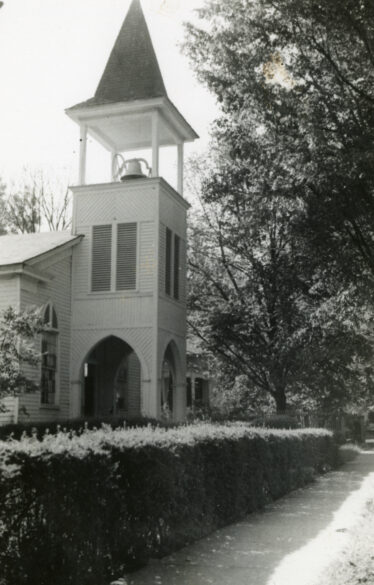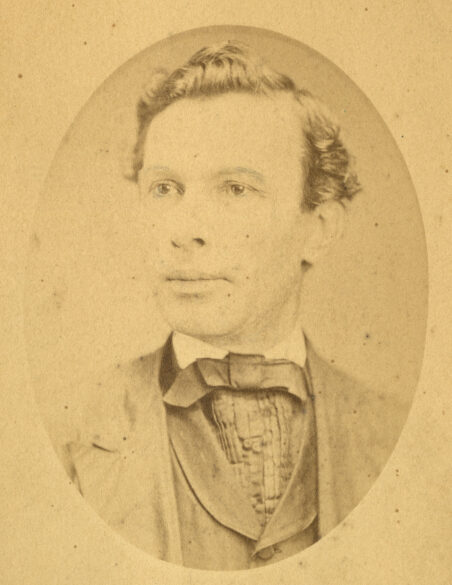From the Archives
By Mary Woodward
JACKSON – This past June at the U.S. bishops’ annual spring meeting, the Diocese of Shreveport put forward the cause for canonization of five priests who had served and died there during the 1873 Yellow Fever epidemic. These men ministered to the sick and dying in and around Shreveport until succumbing to the dreaded fever themselves.

I mentioned in the last installment of this series that our second bishop, James Oliver Van de Velde, died of Yellow Fever in 1855. Yellow Fever was a frequent visitor to the South in the 1800s.
Bishop William Henry Elder, our third bishop, contracted the fever but survived it. However, much like Shreveport, Bishop Elder lost six of his priests to the fever’s outbreak in 1878. From Aug. 31 – Sept. 14, 1878, the then Diocese of Natchez lost: Fathers Jean Baptiste Mouton (8/31), Patrick Cogan (9/8), John McManus (9/8), Anacletus Oberti (9/11), Charles Van Queckleberge (9/11) and John Vitolo (9/14).
In a letter from November 1878, Father Patrick Hayden writes Bishop Elder from Columbus lamenting the loss of the six men, especially Father Mouton, who was a trained architect and had designed several of the churches in the eastern half of the diocese, including the original church in Columbus.
Father Cogan was in Canton and was said to be the only remaining minister in the town when the outbreak occurred. An interesting note from a newspaper article reveals ministers of other denominations wanted to stay but were convinced to leave due to the fact that they had wives and children, who would be left destitute without them if they died. There is a monument for Father Cogan at Sacred Heart in Canton.
We must remember, though, that alongside these priests were fearless women religious – Sisters of Mercy and Sisters of Charity – Angels, who served as nurses to the sick and eventually themselves died. Rarely are these heroic women given names, but in the case of Holly Springs St. Joseph, we do have at least the first names of the six Sisters of Charity who died – Stanislaus, Stella, Margaret, Victoria, Lorentia and Corinthia.
Cleta Ellington in her masterwork “Christ the Living Water” written for the Diocese of Jackson’s 150th anniversary in 1988, gives a stirring account of the epidemic of 1878 in Holly Springs. It follows below along with the tribute given to Sister Corinthia Mahoney by an eyewitness account.
“In the late summer and early fall of 1878, yellow fever swept across Mississippi like a conquering army, but it appeared that Holly Springs was to be spared. The city fathers, in a burst of generosity and believing that the germ could not live in such a high and dry climate, opened the doors of the town to fever refuges from surrounding counties.
“Two articles from New Orleans newspapers reveal the swiftness with which the townspeople learned their leadership was in error.
“Aug. 13, 1878: ‘The town is clean and healthy…no symptoms of the outbreak here. We have thrown open our hospitality to our sister cities, even accepting Grenada where the fever rages. The mayor and the community council decided today to use disinfectants merely as a precautionary…’
“Aug. 19, 1878: ‘Yesterday there were seven deaths, last night six, five of whom died in our house. The situation is too appalling to be described and the worst is, not a single case has recovered or promises recovery.’
“The Marshall County Courthouse was turned into a hospital where beds were piles of straw, where black and white lay together to await medical treatment almost certainly useless.
“The 12 sisters at Bethlehem Academy closed the school and took over the courthouse hospital. They were joined by a number of volunteer doctors who had heroically rushed to the town and by Father Anacletus Oberti, a friendly Italian priest, 31 years old, who had been working very hard to establish a Catholic library at St. Joseph.

“Six of the sisters, all of them part of the original group at Holly Springs, died during September and October. Father Oberti died on Sept. 11. Over 300 of the townspeople perished, 30 of them Catholic.
“Dr. R.M. Swearingen, a volunteer from Austin, Texas, penciled a tribute to Sister Corinthia Mahoney on the plaster wall of a jury room.
“It remained there until 1925 when the courthouse was renovated.
“To save the tribute, R.A. McDermott had workmen remove that section of the wall. Then he took it to Nazareth, Ky., where it remained until 1971 when it was returned to Holly Springs to the Marshall County Historical Museum where it can be seen today.
Within this room, September 1878, Sister Corinthia sank into enteral sleep. Among the first to enter this realm of death, she was the last, save one, to leave. The writer of this humble notice saw her in health, gentle but strong, as she moved with noiseless step and serene smiles through the crowded wards. He saw her when the yellow plumed angel threw his golden shadows over the last sad scene, and eyes unused to weeping paid the tribute of tears to the brave and beautiful “Spirit of Mercy.”
She needs no slab of Parisian marble
With its white and ghastly head,
To tell wanderers in the valley
The virtues of the dead.
Let the lily be her tombstone,
And dewdrops pure and bright,
The epitaphs the angels write
In the stillness of the night.
R.M. Swearingen, M.D.
Austin, Texas
Let no one deface.
“Father Oberti and the sisters were laid to rest in the local cemetery where a monument was erected by a grateful town. And Bethlehem Academy reopened its doors.”
Kudos to Shreveport for putting forward the five martyrs from their diocese. The clergy and sisters in our diocesan history may be called martyrs too.
(Mary Woodward is Chancellor and Archivist for the Diocese of Jackson.)
